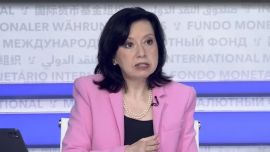Chile's Central Bank on Wednesday announced a US$4 billion injection to stop a currency slide that saw its peso reach historic lows on two successive days.
Amidst a weeks-long crisis, the peso fell to 795 to the US dollar at the close on Wednesday after a previous record low of 783 on Tuesday.
The bank said it had taken the measure to "mitigate eventual tensions" in the financial markets. It expressed fear that the combination of social unrest and a lack of cash flow at the end of the year would see the currency fall even further.
The foreign currency injection will be done in the form of 30- and 90-day tenders for futures between November 14 and January 9.
Chile's peso's previous record low was 761 to the dollar in October 2002. The currency has been hit hard by nearly four weeks of protests against the economic policies of right-wing President Sebastián Piñera.
It was trading at 709 to the dollar on October 18 when the protests erupted into violence. A total of 21 people have died in the unrest in Santiago and other cities since then. Some 2,000 people have been hurt, 200 of which suffered eye injuries from pellets fired by security forces.
Piñera has announced a raft of measures to pacify demonstrators angry at social and economic inequality, but many are demanding the president stand down.
The fall in the currency has raised fears that inflation will increase and GDP growth will slow.
The Santiago stock exchange lost almost three percent having dropped more than 1.5 percent on Tuesday too.
– TIMES/AFP
related news

Argentina shale can resist political risk, Milei oil chief says

IMF offers Milei timely backing, hails progress on inflation, fiscal reform

Flight carrying Argentines deported from United States lands in Buenos Aires




















Comments